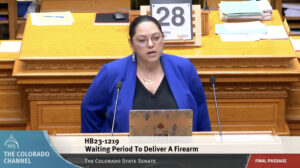Colorado homebuilders and advocates for increased condominium construction are fighting a two-part battle at the Legislature over the resurrected issue of construction-defects reform — putting them both on the defensive on and the offensive on the long-debated subject.
On one hand, they are seeking changes to House Bill 1192, a bill to remove some restrictions on use of the Colorado Consumer Protection Act in ways that could allow more plaintiffs with individual claims to seek bigger damages by categorizing disputes as violations of deceptive trade practices. As written, the bill could elevate defects claims on single-family homes to being as lucrative for attorneys to press as multifamily claims under the Construction Defect Action Reform Act, which played a big part in practically shutting down condo building in the state.
On the other hand, Gov. Jared Polis’ rollout of his land-use-reform plan that is meant to spur increased building of housing in cities and along busy corridors is spurring advocates of further defects reform to say that now is the time to pass new laws to boost condo construction. However, there is no single proposal on how to change the law in order to do that right now.
Both issues could reach inflection points next week. HB 1192, which had a hearing in the Senate Judiciary Committee on March 22, is up for a vote Wednesday amid intense lobbying from builders’ and business groups. And Senate Bill 213, the land-use bill, has its first hearing in the Senate Local Government and Housing Committee on Thursday, with some largely supportive groups pressing to use the hearing to seek construction-defects reform.
“Builders support the general concepts in the proposed housing bill framework and believe it includes some important tools and a blueprint for more attainable housing,” said Ted Leighty, CEO of the Colorado Association of Home Builders, in a statement to The Sum & Substance. “However, CAHB has concerns that the potential of this legislation will never be fully realized until we overcome obstacles created by the proliferation of construction defects litigation, which increases the liability incurred by builders and developers — and their trade partners — thereby deterring new housing construction.”
An issue with history
Condominiums — often a more affordable option for entry into home ownership — accounted for 24.1% of all new home starts in the eight-county Denver metro area in 2007, but they fell to just 2.5% in 2015, according to CAHB statistics. Builders have pointed to the passage of CDARA, which made it much easier for homeowners’ association boards to file construction-defects lawsuits against builders and in turn ballooned the cost of insurance for those firms building owner-occupied multifamily products.
In 2017, the Legislature passed a bill requiring a majority of homeowners, rather than just the majority of a board, to have to approve such lawsuits, and just months later the Colorado Supreme Court ruled that HOAs could not unilaterally nix provisions in their contracts requiring disputes to go to arbitration rather than lawsuits. But as of the third quarter of last year, condos accounted for just 4.3% of new housing stock locally, as some lawsuits continue to be filed and insurance prices remain too high for many builders to take on the cost of such construction.

A construction crew works in downtown Denver on Friday.
HB 1192, which passed the House on a 41-21 vote on March 7, is a three-part bill that strengthens Colorado price-gouging and antitrust law — changes that are largely unopposed. But the first section of the bill makes several key changes to the CCPA, and it’s those changes that opponents seek to strike from the proposal.
As it stands now, the bill removes provisions of law that any require “significant impacts” to the public for a deceptive trade practice to be a violation of the CCPA and require such a practice to be the result of knowing and reckless intent by the business performing it. HB 1192 also establishes that requiring contracts with clauses that are disallowable in Colorado — such as a range of non-compete agreements outlawed last year — are also a deceptive trade practice.
The dispute over 1192
Expanding what can be considered a deceptive trade practice under CCPA is important because it allows plaintiffs to receive treble damages of three times the value of actual damages, and it allows them to receive attorneys’ fees. Such boosts in awards are enough to get attorneys to take on cases that they otherwise wouldn’t have financial incentive to press, both proponents and opponents of the bill said.
The “knowing and recklessly” standard is required in just three states and can be extremely difficult to prove, hindering people who have been hurt by shoddy business dealings from getting access to justice, said co-sponsoring Sen. Julie Gonzales of Denver.

Colorado Sen. Julie Gonzales speaks on the Senate floor during a debate in March.
Meanwhile, the “significant impact” provision requires monetarily injured plaintiffs not only to prove that an unspecified number of other people were hurt by the same actions but drives up the cost of prosecuting such cases because of the need to find other victims, said Nina DiSalvo, policy director for the law firm Towards Justice.
“It increases the burden on someone who’s been cheated and just wants to get their money back,” DiSalvo told the Senate Judiciary Committee.
But Scott Wilkinson, a partner at Davis & Ceriani PC, said the practical effect of the changes would be to create financial incentives for attorneys to press construction-defects lawsuits on single-family homes with the same fervor they did on condominiums. And by eliminating public-impact and reckless-behavior requirements, it would permit CCPA claims, which are now filed only in a limited number of cases, to be pressed against “garden-variety negligence or breach-of-contract lawsuits,” Wilkinson said in a Feb. 25 analysis for Leighty and the CAHB.
“By creating a fee claim and potential for treble damages, smaller single-family-home claims would be elevated to defect claims worth pursuing (particularly for boutique construction-defect firms that are running out of multifamily projects to sue due to the lack of significant, for-sale, multifamily development in Colorado),” Wilkinson wrote. “This risks single-family housing falling victim to the same issues that have plagued multifamily, for-sale housing products for the last decade.”
Effect on housing efforts
And if that were to happen, Vail Valley Partnership President/CEO Chris Romer told the judiciary committee, it would stifle the state’s efforts through bills like SB 213 to boost the amount of affordable workforce housing.
As such, the Homeownership Opportunity Alliance — an organization of construction groups, housing advocates and chambers of commerce — asserted just after Polis announced his land-use plan that it supported the general concepts in the housing bill but felt it lacked in one area. Specifically, the group noted in a news release, the plan doesn’t proffer any ideas on how to reduce construction-defects lawsuits or reduce the high costs of condo-construction insurance.
Wilkinson acknowledged in an interview that it will take time for insurance costs to come down, as the long history of lawsuits against so many projects will remain an inhibiting factor for insurers until the legal actions no longer are so prevalent. Many insurers exited the Colorado condo market as lawsuits increased, and those that do still cover owner-occupied multifamily housing sell only wrap policies that cover the liability of both contractors and subcontractors under one premium that can run $10 million or more for a substantial building project.
Leighty said that current law is so broad in its designation of liability that builders can be sued even for mistakes they didn’t make, such as constructing to a design that was later found to be flawed. Changing the law to reduce the liability on builders and their insurance policies would very likely reduce lawsuits and reduce insurance premiums, clearing arguably the biggest barrier to the construction of entry-priced condos, he suggested.
Other proponents of change have suggested that Colorado should look at allowing builders the right to repair identified flaws in condominiums. Unit owners who have gone through legal action with builders in the past have said, however, that they do not want the firm responsible for causing them issues with their homes to be the one dictating fixes to them.
The bill title for SB 213, sponsored by Senate Majority Leader Dominick Moreno, D-Commerce City, is written narrowly enough that it may be hard to fit into it any amendments on construction-defects reform, forcing advocates to introduce a standalone bill that will be harder to pass.

Colorado Senate Minority Leader Paul Lundeen speaks to the Colorado Chamber of Commerce board of directors.
As such, Senate Minority Leader Paul Lundeen, R-Monument, recently suggested that advocates put a “stake in the ground” now to stop any bills this year that might roll back what advances were made by the 2017 law and then figure out proactive measures for next session.
“That’s one thing: Let’s not make the problem worse,” Lundeen told the Colorado Chamber of Commerce board of directors at its March meeting. “You just ask the right questions: Does this make it more or less likely to create lawsuits?”
